 An article in the Irish Times has highlighted difficulty associated with the most recent decision by the European Court of Human Rights (ECHR) in dealing with Religious Discrimination in the workplace.
An article in the Irish Times has highlighted difficulty associated with the most recent decision by the European Court of Human Rights (ECHR) in dealing with Religious Discrimination in the workplace.
In the case of Eweida and Others v. the United Kingdom the judgement delivered stated that the right to manifest religion at work is protected by the European Convention on Human Rights but must be balanced against the rights of others.
The employee (Ms Eweida) in this case worked at a check-in desk for British Airways and the rules related to her uniform stated any accessory worn for religious reasons should be hidden or approved. The hijab, a headscarf worn by female Muslim staff was allowed, as was the Sikh turban for men. In September 2006, the employee wore her cross and chain visibly, refused to remove it, and was sent home without pay. She was offered administrative work with no uniform, but she rejected the offer.
After negative publicity about the case, the airline changed its policy to allow the wearing of crosses and the employee returned to work in February 2007. But the company refused to compensate her for loss of earnings. The employee took a case for loss of earnings to the domestic employment tribunal and the employment appeals tribunal. Her appeal was eventually rejected by the British Supreme Court in May 2010.
The ECHR found in favour of this employee. It said the refusal of British Airways to allow her visibly wear her cross and chain was an interference with her right to manifest her religion. It found the British courts had not struck “a fair balance” between her rights and the employer’s wish to project a “certain corporate image”. There was no evidence of “any real encroachment on the interests of others” and in those circumstances, the domestic authorities “failed sufficiently to protect” Ms Eweida’s rights.
It is noteworthy to state that three other claimants had their cases heard on their perceived religious discrimination in the workplace, their claims were not successful. It shows how difficult it was for the judges who heard the claims to apply this broad principle to the cases they were deciding. The ruling shows that there is no easy way of balancing the rights of gay people and Christians – it all depends on the circumstances.
